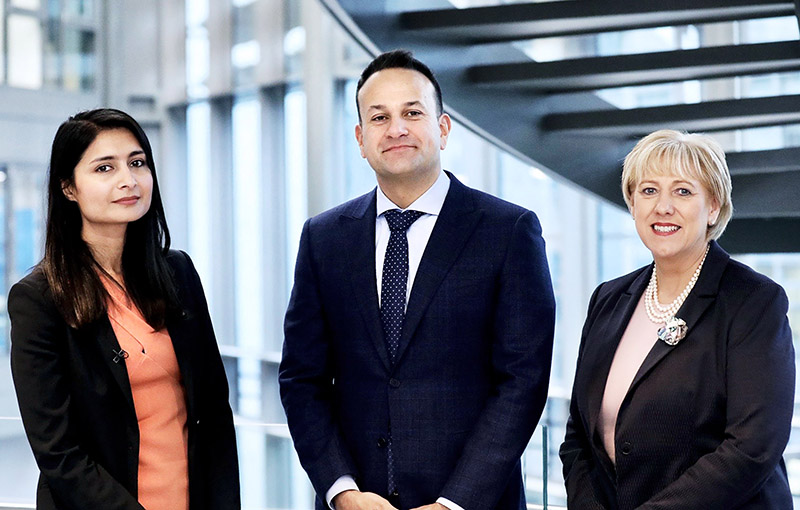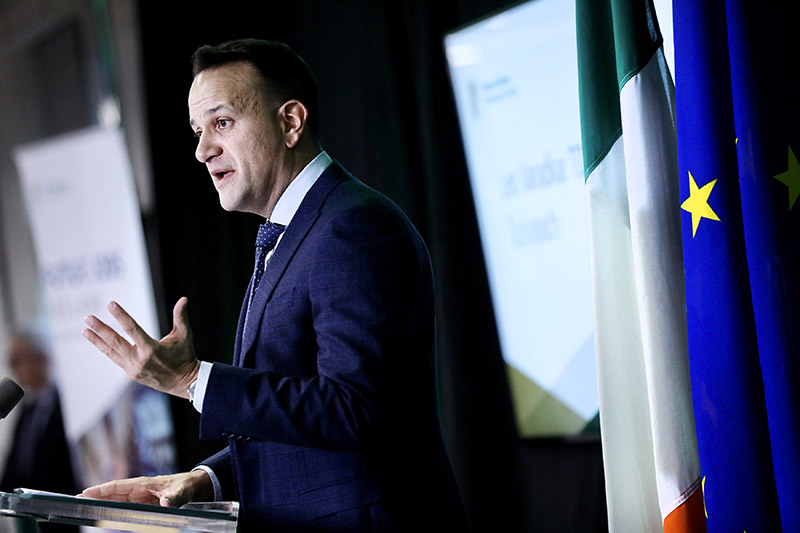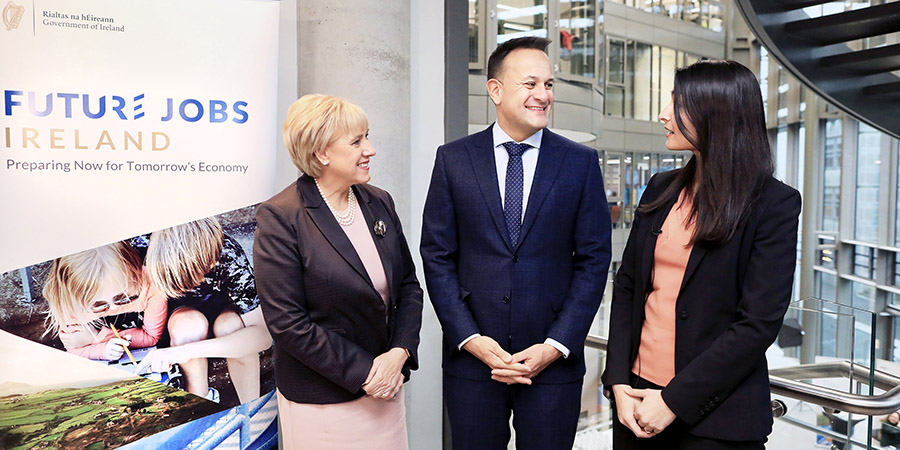7th November 2019
- Taoiseach and Minister Humphreys convene Summit of 200 stakeholders to discuss progress on Future Jobs Ireland, the whole-of-Government plan to prepare our businesses and workers for the future.
- Summit focuses on three themes with a view to finalising goals for 2020: transitioning, clustering and new modes of working.
- Ministers McHugh and Mitchell O’Connor announce €300m investment in higher education under the Human Capital Initiative to meet future skills needs.
Dublin, Ireland, 7 November 2019 An Taoiseach, Leo Varadkar TD, and Minister for Business, Enterprise and Innovation, Heather Humphreys TD, today (Thursday, 7 November) convened a Summit of 200 stakeholders at Tangent in Trinity College Dublin to shape the goals of Future Jobs Ireland in 2020.
Future Jobs Ireland, which was launched in March, is the whole-of-Government plan to secure our economic success in a changing world.

An Taoiseach and Minister Humphreys with Saadia Zahidi from the World Economic Forum
Seven Government Ministers led the consultation event, which was attended by employers, workers and business representative bodies. A keynote address was given by Saadia Zahidi, Managing Director of the World Economic Forum’s Centre for the New Economy and Society.
Progress made under the strategy so far includes:
- The announcement today by Ministers McHugh and Mitchell O’Connor of a €300m investment in higher education under the Human Capital Initiative, which is targeted at meeting the future skills needs of the economy.
- Developing a new SME and entrepreneurship strategy, which will be launched before the end of the year.
- Undertaking research on remote and flexible working options, including exploring whether workers should be given the ‘right to disconnect’, which will inform new Government policy in the area.
- Launching a €2.75 million Regional Clustering Fund and opening competitive calls under the Disruptive Technologies Innovation Fund and the Regional Enterprise Development Fund.
- Springboard+ and Skillnet Ireland now offer a series of training programmes with a focus on the future of work in areas like blockchain, Artificial Intelligence (AI), cybersecurity, the Internet of Things, virtual reality and smart factory technology.
- A new female entrepreneurship strategy is in development and will be launched in January.
- Introducing a streamlined process for the spouses and partners of Critical Skills Employment Permit holders.
- Changes to the R&D Tax Credit scheme in Budget 2020 to make it more accessible to our smallest businesses.
- Developing a new Industry 4.0 strategy and a National Strategy on AI.
The discussions at the Summit focused on three specific themes with a view to finalising the key actions in Future Jobs Ireland for 2020 - Transitioning, which is about supporting workers to reskill and upskill where their role or sector is impacted by a changing world; Clustering, which strengthens our regions and encourages businesses, Irish and foreign-owned, to work together and learn from each other; and New Modes of Working, which is about exploring remote and flexible working options, as well as expanding our network of digital hubs across the country.

Speaking at the Summit, An Taoiseach, Leo Varadkar TD, said:
The world is changing fast. Technology continues to herald new ways of doing business and new economic opportunities. It is not only the types of jobs that will be changing, but the way that we work. Future Jobs Ireland ensures that as our economy changes, and traditional industries and practices are disrupted, workers and enterprises are able to transition successfully. If we adapt now, our enterprises can stay competitive and our society resilient. If we don’t then we will quickly fall behind.
Future Jobs Ireland represents a proactive approach to avoiding the mistakes of the past, when we were over-reliant on a few sectors and complacent about future economic risks. My message is simple; there is no tolerance for any complacency at any level within Government, when it comes to the Irish economy.”
Minister for Business, Enterprise and Innovation Heather Humphreys TD, said:
Today, Ireland is doing well. Unemployment has fallen to 4.8%. There are 420,000 more people at work since the start of 2012 and we now have more people working in Ireland today than ever before. We should be proud of our achievements but the advantages we enjoy now won’t last forever.
Future Jobs Ireland is about preparing now for the economic challenges of tomorrow and its strengthis its adaptability. It offers a framework for policy that is organic, responsive, reactive and constantly evolving and that is exactly why we are here today consulting with stakeholders.”
She continued:
This is as much about the wellbeing of our people as it is about the economy, something I am keen to discuss further with stakeholders today. Productivity for workers should never be about working more for less; it should be about working better for more. That’s why in 2020 I am keen to progress initiatives that will help people strike a better work/life balance.
Apart from the fact that this is the right thing to do, it also makes good business sense. This is especially true as we reach full employment and experience labour shortages in some sectors. Companies that offer flexible working options to new parents, for example, are better placed attract and retain talent.”
In her keynote address, Saadia Zahidi from the World Economic Forum said,
The future of jobs will be both more digital and more human. The Irish economy could become a hub for this new wave of talent in the fourth industrial revolution. Most at-risk workers can be promoted into positions with similar skills and higher wages with the right reskilling and upskilling support. If the public and the private sector work together to fundamentally rethink education and training, they can harness the new opportunities of the fourth industrial revolution for workers, companies and the economy broadly.”
Minister for Education and Skills, Joe McHugh, TD, and Minister for Higher Education, Mary Mitchell O'Connor, TD, who attended the Summit, took the opportunity to announce a €300m Human Capital Initiative. The investment will go towards higher education programmes, which are targeted at meeting the future skills needs of the economy. Enhancing skills and developing talent is one of the five pillars in Future Jobs Ireland.
Announcing the €300m Human Capital Initiative,Minister for Education and Skills, Joe McHugh TD, said:
The Future Jobs Summit is the right place to flag the new €300 million investment fund for higher education. The money will help colleges and universities to develop new undergraduate places, as well as create conversion courses to help graduates find the right career path.
A fund of this scale will support colleges and universities to be more innovative. It is an investment in people and skills for the future.”
Minister for Higher Education, Mary Mitchell O’Connor TD, said:
Funding of this scale is great news for our students and for our institutions. This investment will support our institutions to address the skills needs of the economy, future proof graduates and ensure that there is a greater focus across the whole spectrum of higher education courses on promoting and embedding the key skills that employers will value in future. It also aims to contribute to mitigation of Brexit risks, promote regional development and strengthen relationships between the higher education sector and enterprise.”
Minister of State for Training and Skills, John Halligan TD said:
The HCI will incentivise continued reform and innovation in third level provision, building on best practice nationally and internationally, strongly supporting innovation in programme design and delivery. With its strong focus on innovation and agility, it will enable us to ensure that our graduates and the education system as a whole, are in a position to respond positively to the challenges and opportunities ahead.”
Minister of State for Trade, Employment, Business, EU Digital Single Market and Data Protection, Pat Breen TD, said:
Future Jobs Ireland is about preparing now for the economic challenges of tomorrow. The Digital Age continues to offer exciting opportunities so it is important that our talented workforce, which has been so fundamental to our economic progress, continues to have the skills needed in the future. In 2019, we made significant progress under the strategy. We will maintain this momentum in 2020, through, for example, helping workers to transition to new job roles and by fostering more clusters that provide opportunities throughout all regions of the country.”
The Departments of the Taoiseach and Business, Enterprise and Innovation will now take the feedback from the Summit and work collaboratively with Departments and stakeholders to develop commitments for inclusion in Future Jobs Ireland 2020 which is to be launched early in the new year.
Ends.
About the Future Jobs Ireland Summit

The Future Jobs Ireland Summit is a half day event and will be addressed by Taoiseach Leo Varadkar and Minister for Business, Enterprise and Innovation, Heather Humphreys, TD.
The Summit will feature a keynote speech from Ms Saadia Zahidi, Managing Director of the Centre for the New Economy and Society at the World Economic Forum on global trends for the future of work and skills.
A number of Government Ministers will attend the Summit (and will chair discussions with attendees exploring issues around three specific economic themes on the day: Transitioning, Clustering and New Modes of Working.
- Minister for Agriculture, Food and the Marine, Michael Creed TD
- Minister for Employment Affairs and Social Protection, Regina Doherty TD
- Minister for Education and Science, Joe McHugh, TD
- Minister for Rural and Community Development, Michael Ring TD
- Minister of State at the Department of Education and Skills with special responsibility for Higher Education, Mary Mitchell O’Connor TD
- Minister of State for Trade, Employment, Business, EU Digital Single Market and Data Protection, Pat Breen TD
Future Jobs Ireland – the story so far
Future Jobs Ireland, launched in March 2019, is an ambitious, medium-term framework to create a sustainable, resilient and future-oriented economy in Ireland over the years to 2025.
Our strong economic performance of recent years, with record numbers in employment, cannot be taken for granted. We must ensure our economy is well-positioned to adapt to both a low-carbon future and increased digitalisation and automation.
Productivity levels in indigenous firms must rise as the best way to achieve sustainable wage and wider economic growth. Our labour force is our greatest asset. We have a strong talent pool but we must ensure skills evolve as the economy changes. We also need to increase labour market participation, in particular among those who are currently underrepresented.
Moreover, we want to facilitate a better work/life balance within the workforce to improve the wellbeing of the nation.
All of this needs to be achieved in a time of Brexit, and of increased trade protectionism and geopolitical risk.
Future Jobs Ireland is framed around five Pillars:
- embracing innovation and technological change;
- improving SME productivity;
- enhancing skills and developing and attracting talent;
- increasing participation in the labour force; and
- transitioning to a low carbon economy.
Each Pillar has high-level targets to be achieved by 2025:
Pillar 1 | Pillar 2 | Pillar 3 | Pillar 4 | Pillar 5 |
Gross Expenditure on Research & Development to 2.5% of GNP | Increase multifactor productivity in the domestic economy by an average of 1% per year | Double participation in lifelong learning to 18% | Increase participation rates for people aged 25 to 69 to 78% | Share of total energy use from renewable sources to 20% |
Specific commitments to contribute towards achieving these targets, which are time-bound and measurable, are developed annually.
Although only 8 months since Future Jobs Ireland was launched, there has been significant progress. A selection of these achievements is outlined below.
Funds and Supports
Under Future Jobs Ireland 2019 several competitive calls for Government funding have launched to drive our ambition of a resilient and future-proofed economy. Some are pilots which can be reviewed and developed over the medium-term. Others are large multi-annual funds to address long-term needs across Ireland.
Examples include the following:
- The Future Growth Loan Scheme was opened for applications in April. This scheme provides long-term loans of up to €3 million to SMEs for strategic investment to grow their businesses.
- The first tranche of the Human Capital Initiative has now been launched, providing substantive investment in higher education to promote innovative and responsive delivery models
- The Regional Technology Clustering Fund was launched on 1 July by the Minister for Business, Enterprise and Innovation. It provides an initial €2.75 million to build sectoral clusters of SMEs and Institutes of Technology/Technological Universities.
- The Research and Development Tax Credit has been reviewed and changed in Budget 2020 to make it more accessible to micro and small businesses.
- Launch of the second call of the Disruptive Technologies Innovation Fund.
Policy Development
Concrete developments in important policy areas have been achieved. Examples include the following:
- The Department of Business, Enterprise and Innovation, working with the Department of Justice and Equality, has introduced a streamlined process to ensure spouses/partners of critical skills employment permit holders have immediate access to the Irish labour market without the need for an employment permit.
- Springboard+ and Skillnet Ireland now offer a series of training programmes with a specific focus on the future of work. Courses are now available including leadership and management, blockchain, AI, cybersecurity, Internet of Things, virtual reality and smart factory technology.
- The Cruinniú GovTech Summit promoted greater interaction between Government, academia and industry to leverage the use of digital technology within Government to improve public services.
More developments will also be finalised over the coming months including an Industry 4.0 strategy; a National Strategy on AI; and an SME and Entrepreneurship strategy.
Stakeholder Events
Over the last year, we have had several high-level stakeholder consultations. In addition, a series of events were held by various Departments throughout the Summer to promote the Pillars of Future Jobs Ireland, including:
- Call 2 of the Disruptive Technologies Innovation Fund (Pillar 1 event)
- OECD SME and Entrepreneurship Strategy Conference (Pillar 2 event)
- Remote Working Consultation Forum (Pillar 4 event)
- Workshop on a Roadmap for the Creative Industries
- Several consultation events on the AI strategy with industry, academia, civil society and the public sector
- Climate Action Town Hall meeting (Pillar 5 event)
- Open Policy Debate on ‘A Strategy for the Agri-Food Sector to 2030’
Future Jobs Ireland 2020
While Future Jobs Ireland will continue to focus on its five established pillars, at this year’s Summit three cross cutting areas will be highlighted as particularly important for 2020. These are new modes of working, the impact of transition, and clustering. In 2019 significant first steps have been made in these areas which will be built upon in future years.
For example:
- The National Economic Social Council will provide recommendations by the end of the year as to how the Government should coherently and proactively respond to the workers, enterprises and sectors that are vulnerable to the technological and low carbon transition.
- Work is ongoing in the Department of Justice and Equality and the Department of Business, Enterprise and Innovation on flexible working and remote working so as to promote better work/life balance and reduce barriers to enter the labour market.
- A cybersecurity cluster was launched in Cork this year and progress is being made on a National Centre of Excellence on High Performance and Nearly Zero Energy Building.
- Three ‘Top Teams’ are on track to be established this year on Artificial Intelligence, GovTech and Offshore Renewables. This is a pilot approach involving Government and the private sector working together to capitalize on the opportunities these new growth areas present.
The above is just a sample of progress made this year under Future Jobs Ireland and points towards the direction of travel for next year.
Future Jobs Ireland marks a major shift for Government, and this year we have taken important steps towards our goals. In 2020 we will continue to drive changes across the country to make the Irish economy more sustainable, resilient and productive.
About the Human Capital Initiative
The primary objective of the Human Capital Initiative (HCI) is to underpin the provision of additional capacity across the Higher Education Sector to meet priority skill needs for enterprise. It represents an additional investment of €300m (€60m per annum from 2020 to 2024) from the surplus in the National Training Fund in line with recommendations contained in the independent review of the National Training Fund on the use of the surplus and the development of labour market skills.
The HCI will consist of 3 main pillars – graduate conversion and specialisation courses, additional places on undergraduate provision, and an innovation and agility fund. These pillars will form the basis of three competitive calls over the coming months.
ENDS
The Department of Business, Enterprise and Innovation (DBEI) plays a key role in implementing the Government’s policies of stimulating the productive capacity of the economy and creating an environment which supports job creation and maintenance. The Department has lead responsibility for Irish policy on global trade and inward investment and a remit to promote fair competition in the marketplace, protect consumers and safeguard workers.
For further information please contact Press Office, D/Business, Enterprise and Innovation, press.office@dbei.gov.ie or 01 631 2200.
If you no longer wish to receive emails from the Department of Business Enterprise and Innovation Press Office, please notify us by email to press.office@dbei.gov.ie.
Back to Department News